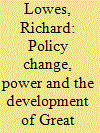| Srl | Item |
| 1 |
ID:
176831


|
|
|
|
|
| Summary/Abstract |
The decarbonisation of heating represents a transformative challenge for many countries. The UK's net-zero greenhouse gas emissions target requires the removal of fossil fuel combustion from heating in just three decades. A greater understanding of policy processes linked to system transformations is expected to be of value for understanding systemic change; how policy makers perceive policy issues can impact on policy change with knock-on effects for energy system change. This article builds on the literature considering policy maker perceptions and focuses on the issue of UK heat policy. Using qualitative analysis, we show that policy makers perceive heat decarbonisation as disruptive, technological pathways are seen as deeply uncertain and heat decarbonisation appears to offer policy makers little ‘up-side’. Perceptions are bounded by uncertainty, affected by concerns over negative impacts, influenced by external influences and relate to ideas of continuity. Further research and evidence on optimal heat decarbonisation and an adaptive approach to governance could support policy makers to deliver policy commensurate with heat decarbonisation. However even with reduced uncertainty and more flexible governance, the perceptions of disruption to consumers mean that transformative heat policy may remain unpopular for policy makers, potentially putting greenhouse mitigation targets at risk of being missed.
|
|
|
|
|
|
|
|
|
|
|
|
|
|
|
|
| 2 |
ID:
180160


|
|
|
|
|
| Summary/Abstract |
The energy supply system is undergoing enormous change to deliver against cost, security of supply and decarbonisation objectives. Robust decisions on the provision of infrastructure requires integrated models to perform analytics across the entire energy supply chain.
|
|
|
|
|
|
|
|
|
|
|
|
|
|
|
|
| 3 |
ID:
166733


|
|
|
|
|
| Summary/Abstract |
The role of socio-political power is central to the development of policy, but systematic analyses of power associated with the development of energy policy are rare. Power is also an important yet somewhat under-researched aspect of socio-technical transitions research. The Renewable Heat Incentive (RHI) policy aims to increase deployment of low-carbon heat in Great Britain and begin a transformation to a low carbon GB heat system. This article analyses the socio-political power associated with the development of the RHI policy based on Lukes' ‘dimensions of power’ approach using a methodology based on triangulation. We identify a number of policy change episodes during the development of the RHI and describe the influence of key actors on the policy. Despite the common assumption of the power of incumbents, we show that those actors with niche technological expertise, close relationships with Government actors and actors within the administration have been the most powerful drivers of policy development and change. Niche actors sped up the introduction of the RHI scheme and have also had some success in increasing relative support for biomethane injection. The power of a civil servant to slow the introduction of the domestic element of the RHI has also been identified.
|
|
|
|
|
|
|
|
|
|
|
|
|
|
|
|
| 4 |
ID:
149894


|
|
|
|
|
| Summary/Abstract |
International commitments on greenhouse gases, renewables and air quality warrant consideration of alternative residential heating technologies. The residential sector in Ireland accounts for approximately 25% of primary energy demand with roughly half of primary home heating fuelled by oil and 11% by solid fuels. Displacing oil and solid fuel usage with air source heat pump (ASHP) technology could offer household cost savings, reductions in emissions, and reduced health impacts. An economic analysis estimates that 60% of homes using oil, have the potential to deliver savings in the region of €600 per annum when considering both running and annualised capital costs. Scenario analysis estimates that a grant of €2400 could increase the potential market uptake of oil users by up to 17% points, whilst a higher oil price, similar to 2013, could further increase uptake from heating oil users by 24% points. Under a combined oil-price and grant scenario, CO2 emissions reduce by over 4 million tonnes per annum and residential PM2.5 and NOX emissions from oil and peat reduce close to zero. Corresponding health and environmental benefits are estimated in the region of €100m per annum. Sensitivity analyses are presented assessing the impact of alternate discount rates and technology performance. This research confirms the potential for ASHP technology and identifies and informs policy design considerations with regard to oil price trends, access to capital, targeting of grants, and addressing transactions costs.
|
|
|
|
|
|
|
|
|
|
|
|
|
|
|
|